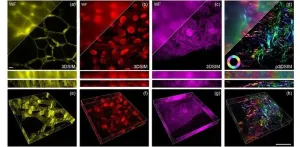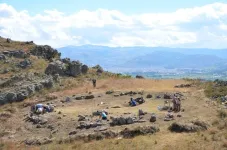(Press-News.org) KEY TAKEAWAYS
The majority of the world’s people live in what are known as “blood deserts,” areas in which the clinical need for blood components cannot be met in at least 75% of cases.
A global coalition of experts led by researchers from the Brigham identified urgent steps that can be taken by health systems to improve access to blood until longer term strategies are established
Billions of people live in parts of the world that are so remote from the nearest hospital facility with a functioning blood bank that they are termed “blood deserts.” Researchers from Brigham and Women’s Hospital, a founding member of the Mass General Brigham healthcare system, and Harvard Medical School have spearheaded a new global collaborative to address the pressing issue of extreme blood unavailability in rural settings and propose short-term strategies to address the urgent need for blood. A paper detailing the recommendations of the new collaborative, named the Blood D.E.S.E.R.T. Coalition, published today in Lancet Global Health.
“As a trauma surgeon in Boston, I cannot fathom not having blood for our patients when they arrive after major injury. Unfortunately, this is the reality in most of the world, and people die unnecessary deaths,” said lead author Nakul Raykar, MD, MPH, a trauma surgeon at Brigham and Women’s Hospital, Assistant Professor of Surgery at Harvard Medical School, and founding Director of the Blood D.E.S.E.R.T Coalition. “It will take decades to build and fund enough functional blood banks to meet the world’s needs. But we do not need to wait – immediate, low-cost solutions already exist that could be implemented today.”
Blood products are a critical part of a wide range of medical treatments, not just surgical and trauma care. For example, people with hemophilia require transfusions of clotting factors that are purified from donor blood. Blood products are also used for a wide range of obstetrics complications, such as postpartum hemorrhage, miscarriage, ectopic pregnancy and others. According to Raykar, lack of blood is a major reason why so many die after trauma in low- and middle-income countries (LMICs)—as high as 50-60% in some studies—compared to the 1-2% mortality rates after trauma seen in developed trauma systems in high-income countries like the United States.
Access to blood in rural areas is affected by several factors, including a lack of blood itself, high costs and long distances between the point of care and whatever blood supply is available. Due to one or more of these factors, the majority of the world’s people live in what are known as blood deserts, areas in which the clinical need for blood components cannot be met in at least 75% of cases.
“Every single country in sub-Saharan Africa and South Asia has a significant blood shortage, and as a result, more than half of the global population doesn’t have access to basic, life-preserving medical care.” said Raykar. “A huge proportion of the challenges facing healthcare providers in these areas is accentuated by this single missing resource.”
The new paper, which summarizes the conclusions of a global coalition of health and medicine experts from around the globe, outline ways health care professionals and governments can significantly increase global access to blood transfusion with several interventions, suitable for implementation in the short term.
Blood shortages are not unique to LIMCs—the American Red Cross recently declared an emergency blood shortage for the U.S. as the number of U.S. blood donors hit an all-time low for the last 20 years—but the problem is exacerbated in settings where the only hospitals with stocked blood banks are in urban centers that are hours away. Researchers estimate that 40% of annual blood donations are collected in high income countries, which serve 16% of the world’s population, leaving most of the world underserved.
The Blood D.E.S.E.R.T Coalition, which stands for the Blood Delivery via Emerging Strategies for Emergency Remote Transfusion Coalition, conducted a three-month series of video conference and live workshops with participants in 11 countries in which they identified urgent research, policy and implementation priorities for health systems to improve access to blood in the interim.
The solutions they proposed include civilian walking blood banks, a military strategy being adapted to civilian contexts in which volunteers within communities are ready and able to give blood at short notice so rural areas don’t have to rely solely on central storage, and intraoperative auto-transfusion, in which a patient’s own blood is recirculated during medical procedures.
“These solutions can’t replace a safe supply of banked, laboratory-screen blood that is immediately available at moment’s notice because they each have their own logistical drawbacks,” said Raykar. “However, in areas where no other blood is available, any solution that gets blood to the people that needs it should be a priority. And these strategies are already quite literally battle-tested for implementation.”
Another strategy suggested by the researchers to get banked blood to patients is drone-based delivery. This would require a bigger investment to implement safely compared to the other strategies, they note, and drones on their own are unlikely to be an effective solution for blood shortages on the scale found in blood deserts. However, drones could play an important part of a comprehensive strategy and can complement the other interventions.
“All of these solutions work together,” said Raykar. “It’s all about creating a short-term system to support places that don’t have access to blood while we create long-term, sustainable solutions to the global blood crisis. The recommendations we’ve outlined are a strong step in the right direction, but there’s a lot more that needs to be done.”
The Blood D.E.S.E.R.T Coalition’s mission is to establish the research, education, implementation agenda needed to eliminate the world’s blood deserts. The leadership extends across multiple global institutions from the Brigham and Women’s Hospital and Harvard Medical School to 17 institutions from across the world (US Army Surgical Research Institute; World Health Organization, Geneva; Children’s National Hospital, Washington DC; National Blood Service Ghana, Accra; Royal College of Surgeons of Ireland, Dublin; Christian Medical College, Vellore; University of Pittsburgh) located in 10 countries.
Disclosures: The authors declare no competing interests.
Funding: This research was supported by grants from the Harvard Radcliffe Institute for Advanced Study and the Gillian M Reny Stepping Strong Center for Trauma Innovation at Brigham and Women’s Hospital.
Papers cited: Raykar, N. et al. “Innovative blood transfusion strategies to address global blood deserts: a consensus statement from the Blood Delivery via Emerging Strategies for Emergency Remote Transfusion (Blood Desert) Coalition,” Lancet Global Health DOI: 10.1016/S2214-109X(23)00564-8
END
Experts call for innovative strategies to address global blood crisis, form blood D.E.S.E.R.T coalition
For people living in the world’s “blood deserts,” routine medical care is often out of reach; a few innovative transfusion strategies could help temporarily address the problem
2024-02-15
ELSE PRESS RELEASES FROM THIS DATE:
Walking, jogging, yoga and strength training ease depression
2024-02-15
Walking or jogging, yoga, and strength training seem to be the most effective exercises to ease depression, either alone or alongside established treatments such as psychotherapy and drugs, suggests an evidence review published by The BMJ today.
Even low intensity activities such as walking or yoga are beneficial, but the results suggest that the more vigorous the activity, the greater the benefits are likely to be.
The authors stress that confidence in many of the findings remains low ...
Doctors quitting over stress and cost of finding suitable childcare
2024-02-15
Securing suitable childcare for the irregular and long working hours demanded by a medical career is a crippling financial burden and a draining source of stress for doctor parents, reveals an exclusive snapshot survey by The BMJ today.
Some doctors have resigned or are considering resigning, others have changed specialities in the hope that it gives them more flexibility, and yet more altered their plans to have children as a result, reports health journalist Erin Dean.
The BMJ Childcare Survey ran on bmj.com from 16 to 30 November ...
Companies are adopting feminist narratives to influence women’s health
2024-02-15
Feminist health narratives are being co-opted by commercial interests to market new technologies, tests, and treatments that are not backed by evidence, argue researchers in The BMJ today.
Dr Tessa Copp at The University of Sydney and colleagues say such marketing behaviour risks harming women through inappropriate medicalisation, overdiagnosis, and overtreatment.
They call for greater wariness of simplistic health messages that any knowledge is power, and urge health professionals and governments ...
The BMJ reveals huge delays in dealing with complaints against UK drug companies
2024-02-15
Processing times for complaints against drug companies suspected of having breached their industry code of practice have more than tripled in a nearly two-decade period, an investigation by The BMJ has found.
Data analysis by Shai Mulinari at Lund University and Piotr Ozieranski at the University of Bath show that the average processing time of a complaint more than tripled between 2004-2021, from less than three months to more than 8.5 months. Numerous complaints have taken more than a year ...
School uniform policies linked to students getting less exercise, study finds
2024-02-15
School uniform policies could be restricting young people from being active, particularly primary school-aged girls, new research suggests.
The University of Cambridge study used data about the physical activity participation of more than a million five-to-17-year-olds internationally. It found that in countries where a majority of schools require students to wear uniforms fewer young people tend to meet the 60 minutes of physical activity per day recommended by the World Health Organisation (WHO).
Regardless of uniform policies, across most countries fewer girls than boys reach those ...
Scientists are unravelling the secrets of red and grey squirrel competition
2024-02-15
In a first of its kind study, researchers have identified significant differences between the diversity of gut bacteria in grey squirrels compared to red squirrels which could hold the key to further understanding the ability of grey squirrels to outcompete red squirrels in the UK.
New research, published in the Journal of Medical Microbiology, looked to understand more about the mechanisms by which grey squirrels are able to gain an advantage over red squirrels. Chris Nichols, Conservation Evidence ...
Targeting the microenvironment rather than a specific cell type could be the key to healing injured hearts
2024-02-15
A groundbreaking scientific study published in Nature Cardiovascular Research has unveiled a remarkable discovery that may have far-reaching implications for the treatment of heart disease.
The intensive investigations utilizing single-cell genomics and genetic experiments were conducted by a team of renowned scientists in the Cardiomyocyte Renewal Laboratory and McGill Gene Editing Laboratory at The Texas Heart Institute, including James F. Martin Vivian L. Smith Chair in Regenerative Medicine and Vice Chairman and Professor ...
Live from the brain: Visual cues inform decision to cooperate
2024-02-14
HOUSTON – (Feb. 14, 2024) – Eye contact and body language are critical in social interaction, but exactly how the brain uses this information in order to inform behavior in real time is not well understood.
By combining behavioral and wireless eye tracking and neural monitoring, a team of Rice University scientists and collaborators studied how pairs of freely moving macaques interacting in a naturalistic setting use visual cues to guide complex, goal-oriented cooperative behavior. The study published in Nature offers first evidence that the part of the brain that processes visual information ⎯ the visual cortex ⎯ plays an active role in social behavior by providing ...
Super-resolution microscopy harnesses digital display technology
2024-02-14
In the ever-evolving realm of microscopy, recent years have witnessed remarkable strides in both hardware and algorithms, propelling our ability to explore the infinitesimal wonders of life. However, the journey towards three-dimensional structured illumination microscopy (3DSIM) has been hampered by challenges arising from the speed and intricacy of polarization modulation.
Introducing the DMD-3DSIM System
Enter the high-speed modulation 3DSIM system “DMD-3DSIM,” combining digital display with super-resolution imaging, allowing scientists to see cellular structures in unprecedented detail. As ...
UW anthropologists’ research unveils early stone plaza in the Andes
2024-02-14
Two University of Wyoming anthropology professors have discovered one of the earliest circular plazas in Andean South America, showcasing monumental megalithic architecture, which refers to construction that uses large stones placed upright with no mortar.
Located at the Callacpuma archaeological site in the Cajamarca Basin of northern Peru, the plaza is built with large, vertically placed megalithic stones -- a construction method previously unseen in the Andes. Associate Professor Jason Toohey, project lead, and Professor Melissa Murphy have been researching ...
LAST 30 PRESS RELEASES:
New book captures hidden toll of immigration enforcement on families
New record: Laser cuts bone deeper than before
Heart attack deaths rose between 2011 and 2022 among adults younger than age 55
Will melting glaciers slow climate change? A prevailing theory is on shaky ground
New treatment may dramatically improve survival for those with deadly brain cancer
Here we grow: chondrocytes’ behavior reveals novel targets for bone growth disorders
Leaping puddles create new rules for water physics
Scientists identify key protein that stops malaria parasite growth
Wildfire smoke linked to rise in violent assaults, new 11-year study finds
New technology could use sunlight to break down ‘forever chemicals’
Green hydrogen without forever chemicals and iridium
Billion-DKK grant for research in green transformation of the built environment
For solar power to truly provide affordable energy access, we need to deploy it better
Middle-aged men are most vulnerable to faster aging due to ‘forever chemicals’
Starving cancer: Nutrient deprivation effects on synovial sarcoma
Speaking from the heart: Study identifies key concerns of parenting with an early-onset cardiovascular condition
From the Late Bronze Age to today - Old Irish Goat carries 3,000 years of Irish history
Emerging class of antibiotics to tackle global tuberculosis crisis
Researchers create distortion-resistant energy materials to improve lithium-ion batteries
Scientists create the most detailed molecular map to date of the developing Down syndrome brain
Nutrient uptake gets to the root of roots
Aspirin not a quick fix for preventing bowel cancer
HPV vaccination provides “sustained protection” against cervical cancer
Many post-authorization studies fail to comply with public disclosure rules
GLP-1 drugs combined with healthy lifestyle habits linked with reduced cardiovascular risk among diabetes patients
Solved: New analysis of Apollo Moon samples finally settles debate about lunar magnetic field
University of Birmingham to host national computing center
Play nicely: Children who are not friends connect better through play when given a goal
Surviving the extreme temperatures of the climate crisis calls for a revolution in home and building design
The wild can be ‘death trap’ for rescued animals
[Press-News.org] Experts call for innovative strategies to address global blood crisis, form blood D.E.S.E.R.T coalitionFor people living in the world’s “blood deserts,” routine medical care is often out of reach; a few innovative transfusion strategies could help temporarily address the problem



